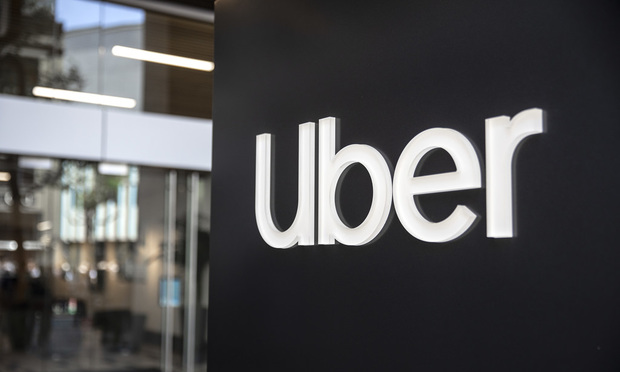Gig Companies Set Lobbying Records Amid Fight Against Landmark Labor Bill
The intense lobbying, however, was not enough to overcome organized labor's support for AB 5, a new law that makes it harder for gig economy companies to classify their workers as independent contractors.
November 01, 2019 at 12:50 PM
3 minute read
 Uber headquarters, located at 1455 Market street in San Francisco, California. Photo: Jason Doiy/ALM
Uber headquarters, located at 1455 Market street in San Francisco, California. Photo: Jason Doiy/ALM
Uber and Lyft spent nearly $675,000 lobbying California lawmakers over the summer as the two ride-hailing companies fought unsuccessfully for a carve-out from landmark labor legislation, new disclosures show.
Lyft paid $446,450 to sway decision-makers in the third quarter, the period when the Legislature took final votes on, and the governor signed, Assembly Bill 5. The legislation codifies much of the California Supreme Court's 2018 ruling in Dynamex Operations West v. Superior Court, making it tougher for gig companies to classify their workers as independent contractors.
Lyft's advocacy spending rose above the San Francisco company's previous record quarterly total by almost 60%. Lyft allocated more money to lobbying in California during the first nine months of 2019 ($866,810) than it did in Washington, D.C., ($700,000) according to data from the Center for Responsive Politics' OpenSecrets.org.
The California lobbying effort reflects the ride-hailing companies' fight to maintain a business model that relies on independent contractors who do not receive overtime, minimum wage guarantees and other benefits that workplace law mandates for employees. The legislation has been lauded by Democratic presidential candidates and eyed with interest by labor leaders and liberal politicians in New York.
Uber and Lyft identified a dozen bills and several state agencies as their lobbying targets; the records, however, don't reveal how much the companies specifically spent on AB 5 itself. But the disclosures suggest a broad focus on the Dynamex legislation. Lyft split its money among four Sacramento lobby shops, a public affairs firm, political consultants and messaging platforms that connected drivers and customers with lawmakers' offices.
The two companies weren't alone in their lobbying efforts on the California worker classification bill. Other gig and technology companies, including DoorDash, Instacart, TaskRabbit, Airbnb, Handy, Postmates and Google, also spent hundreds of thousands of dollars combined lobbying in the third quarter with each one listing AB 5 as a target. Trade groups including the Internet Association and TechNet contributed even more.
The intense lobbying, however, was not enough to overcome organized labor's support for the bill. Gov. Gavin Newsom signed AB 5 into law Sept. 18.
App-based delivery and ride-hailing companies have now turned their attention to a 2020 ballot measure in hopes that voters will give them the AB 5 exemption that lawmakers and Newsom did not. Uber, Lyft, DoorDash and Instacart this week unveiled a proposed initiative that would offer drivers minimum pay, medical care stipends and mileage reimbursements—but not the employee label.
Uber, Lyft and DoorDash have already pledged to spend $90 million on a campaign to get the initiative passed.
Read more:
Sacramento Firm Drafts Ballot Initiative Challenging Landmark Labor Law
Gavin Newsom Is Delivering for Plaintiffs Lawyers, Labor Advocates
Newsom Signs Landmark Gig Labor Bill, as Court Cases Loom
As California Passes Landmark Worker Rights Bill, a Familiar Foe Takes Aim at Uber
New Bill Clears Path for Freelance Attorney Independent Contractor Status
This content has been archived. It is available through our partners, LexisNexis® and Bloomberg Law.
To view this content, please continue to their sites.
Not a Lexis Subscriber?
Subscribe Now
Not a Bloomberg Law Subscriber?
Subscribe Now
NOT FOR REPRINT
© 2025 ALM Global, LLC, All Rights Reserved. Request academic re-use from www.copyright.com. All other uses, submit a request to [email protected]. For more information visit Asset & Logo Licensing.
You Might Like
View All
Law Firms Look to Gen Z for AI Skills, as 'Data Becomes the Oil of Legal'

Law Firms Expand Scope of Immigration Expertise Amid Blitz of Trump Orders
6 minute read
Pearl Cohen Enters San Francisco Market Via Combination With IP Boutique
Trending Stories
- 1Uber Files RICO Suit Against Plaintiff-Side Firms Alleging Fraudulent Injury Claims
- 2The Law Firm Disrupted: Scrutinizing the Elephant More Than the Mouse
- 3Inherent Diminished Value Damages Unavailable to 3rd-Party Claimants, Court Says
- 4Pa. Defense Firm Sued by Client Over Ex-Eagles Player's $43.5M Med Mal Win
- 5Losses Mount at Morris Manning, but Departing Ex-Chair Stays Bullish About His Old Firm's Future
Who Got The Work
J. Brugh Lower of Gibbons has entered an appearance for industrial equipment supplier Devco Corporation in a pending trademark infringement lawsuit. The suit, accusing the defendant of selling knock-off Graco products, was filed Dec. 18 in New Jersey District Court by Rivkin Radler on behalf of Graco Inc. and Graco Minnesota. The case, assigned to U.S. District Judge Zahid N. Quraishi, is 3:24-cv-11294, Graco Inc. et al v. Devco Corporation.
Who Got The Work
Rebecca Maller-Stein and Kent A. Yalowitz of Arnold & Porter Kaye Scholer have entered their appearances for Hanaco Venture Capital and its executives, Lior Prosor and David Frankel, in a pending securities lawsuit. The action, filed on Dec. 24 in New York Southern District Court by Zell, Aron & Co. on behalf of Goldeneye Advisors, accuses the defendants of negligently and fraudulently managing the plaintiff's $1 million investment. The case, assigned to U.S. District Judge Vernon S. Broderick, is 1:24-cv-09918, Goldeneye Advisors, LLC v. Hanaco Venture Capital, Ltd. et al.
Who Got The Work
Attorneys from A&O Shearman has stepped in as defense counsel for Toronto-Dominion Bank and other defendants in a pending securities class action. The suit, filed Dec. 11 in New York Southern District Court by Bleichmar Fonti & Auld, accuses the defendants of concealing the bank's 'pervasive' deficiencies in regards to its compliance with the Bank Secrecy Act and the quality of its anti-money laundering controls. The case, assigned to U.S. District Judge Arun Subramanian, is 1:24-cv-09445, Gonzalez v. The Toronto-Dominion Bank et al.
Who Got The Work
Crown Castle International, a Pennsylvania company providing shared communications infrastructure, has turned to Luke D. Wolf of Gordon Rees Scully Mansukhani to fend off a pending breach-of-contract lawsuit. The court action, filed Nov. 25 in Michigan Eastern District Court by Hooper Hathaway PC on behalf of The Town Residences LLC, accuses Crown Castle of failing to transfer approximately $30,000 in utility payments from T-Mobile in breach of a roof-top lease and assignment agreement. The case, assigned to U.S. District Judge Susan K. Declercq, is 2:24-cv-13131, The Town Residences LLC v. T-Mobile US, Inc. et al.
Who Got The Work
Wilfred P. Coronato and Daniel M. Schwartz of McCarter & English have stepped in as defense counsel to Electrolux Home Products Inc. in a pending product liability lawsuit. The court action, filed Nov. 26 in New York Eastern District Court by Poulos Lopiccolo PC and Nagel Rice LLP on behalf of David Stern, alleges that the defendant's refrigerators’ drawers and shelving repeatedly break and fall apart within months after purchase. The case, assigned to U.S. District Judge Joan M. Azrack, is 2:24-cv-08204, Stern v. Electrolux Home Products, Inc.
Featured Firms
Law Offices of Gary Martin Hays & Associates, P.C.
(470) 294-1674
Law Offices of Mark E. Salomone
(857) 444-6468
Smith & Hassler
(713) 739-1250







